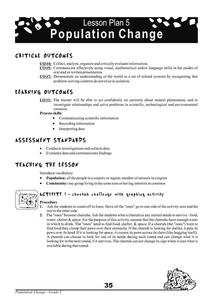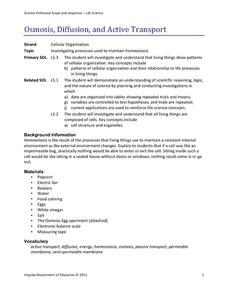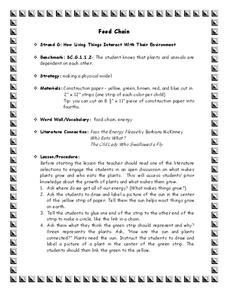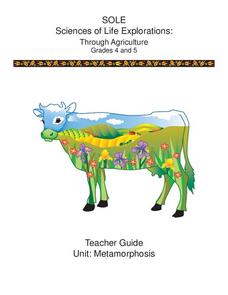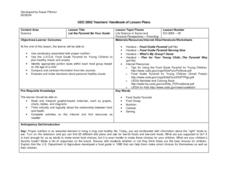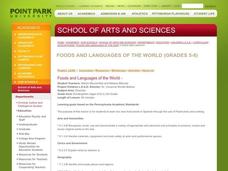Curated OER
Feeding Frenzy
Young biologists take a look at the myriad of ways that animals increase their chances of surviving in the wild. The adaptations help animals hide, hunt, and attract a mate. This lesson plan specifically explores how insect mouth parts...
Desert Discoveries
Amazing Arthropods
Arthropods are the stars of a fine science lesson. Learners look at the diversity, characteristics, adaptations, and important roles that these insects play in the Sonoran Desert environment. A terrific document called "Amazing...
Desert Discoveries
What's In A Habitat?
The concept of a habitat being a home for animals is the main thrust of this life sciences resource. Learners complete a cut-and-paste activity using a fine worksheet that's embedded in the plan. They must place four very different...
Alabama Learning Exchange
Make a Difference!
We are very dependent upon other life forms around us to survive. Here, scholars explore relationships in the ecosystem with the help of Auntie Litter and the pollution patrol. They imagine a world without grass, making connections to...
Curated OER
The Peanut Wizard
Students read and discuss information regarding George Washington Carver and how the peanut became cultivated in the southern colonies of the United States. For this George Washington Carver lesson, students develop vocabulary that...
Cheetah Outreach
Population Change
Your youngsters become cheetahs in search of food, water, shelter, and space in a fun physical game that does a fantastic job of representing fluctuating species population based on resources available over years.
Curated OER
Biological Molecules
Ninth graders examine the structure and function of biomolecules. In this food molecule lesson plan, 9th graders will examine various types of biomolecules such as carbohydrates, lipids, proteins, and nucleic acids. They will...
Virginia Department of Education
Osmosis, Diffusion, and Active Transport
No, it really is okay to play with your food! Emerging scientists manipulate popcorn, eggs, and other household objects as they demonstrate multiple cellular processes. The activity, capable of modifications, is designed to reflect...
Curated OER
Food Sources
Students develop a working vocabulary of food by categorizing foods by their sources or origins. Working in groups, they determine at least four ways in which food is grown or produced. Groups create a poster by diving selected food...
Curated OER
Food Chain
Young scholars explore the cycle of how each living thing gets food. In this food chain unit, students participate in four lesson plans that highlight animal vocabulary, habitats, and the role of humans in our ecosystem. Young scholars...
Curated OER
Food Chain
Students discuss what makes plants grow and who eats the plants. They are asked where do we get all of our energy? Students are asked to draw and label a picture of the sun in the center of the yellow strip of paper. They are explained...
Science Friday
Ugh, a Bug!
Young entomologists familiarize themselves with the physical characteristics of insects. Composed of two activities, each lesson involves your scientists tapping into their prior knowledge of bugs and making observations of real live...
Cornell University
Metamorphosis
Looking for an insect unit that addresses multiple skill strategies? Young entomologists explore multiple life cycles of insects that go through metamorphosis. The brainteasers and mobile activity spark learner interest before guiding...
Chicago Botanic Garden
Understanding the Greenhouse Effect
Dive into the power of the sun with a two-part lesson. Budding scientists model the greenhouse effect in a hands-on activity, and then participate in a skit that explores the earth's energy balances and what really occurs in the...
Curated OER
Mealworms
Crawl into the world of the darkling beetle with this scientific investigation. Watch as the insects move through the larval, pupal, and adult stages of life, recording observations along the way. Discuss the necessities of life as young...
Curated OER
Let the Pyramid Be Your Guide
High schoolers chart foods on the food guide pyramid and design nutritional food plans that include all the food groups.
Curated OER
Animals and Plants of BC's Rocky Shore: lesson 3
Young scholars create a mural of the food chain of the animals and plants of BC's rocky shore. In this food chain lesson plan, students also play a food chain matching game.
Curated OER
Economics: What Are Some Other Uses for Rice?
Sixth graders investigate ways rice is sold by creating a chart of the different rice foods. In this economics lesson, 6th graders examine their local food store and list at least 10 rice by-products in a class chart. Students discover...
Virginia Department of Education
The Effects of Heat and Acid on the Enzyme Catalase
How quickly do enzymatic reactions occur? Assist the class as they examine heat and pH change to determine the rate of chemical reactions using catalase as an enzyme. Watch them "glow" with excitement!
Curated OER
Genetically Modified Foods
Learners explain what genetically modified foods are and how they are created. Students use appropriate vocabulary to describe and effectively discuss the benefits of, and potential risks of, genetically modified foods.
Curated OER
Foods and Languages of the World
Young scholars review Mexico's location and language and learn to pronouns 10 new Spanish food words. Students listen as the book, Corn is Maize is read, touching and passing around an ear of Indian corn. Young scholars discuss the...
Curated OER
What's for Dinner?
Learners investigate the dietary habits of living organisms by creating a model food chain. In this food web lesson, students define several food chain vocabulary words such as omnivore, carnivore and herbivore. Learners...
Curated OER
What Happens to the Food You Eat? The Digestive System
Young scholars observe a video displaying body parts and functions of the digestive system. They make drawings of the digestive system from their observations. They act out a short play involving body parts.
Curated OER
The Science of Respiration and Blood Circulation
Fifth graders study how respiration and circulation are connected. In this respiratory lesson plan students complete several activities to better understand heart rate and carbon dioxide in the body.





